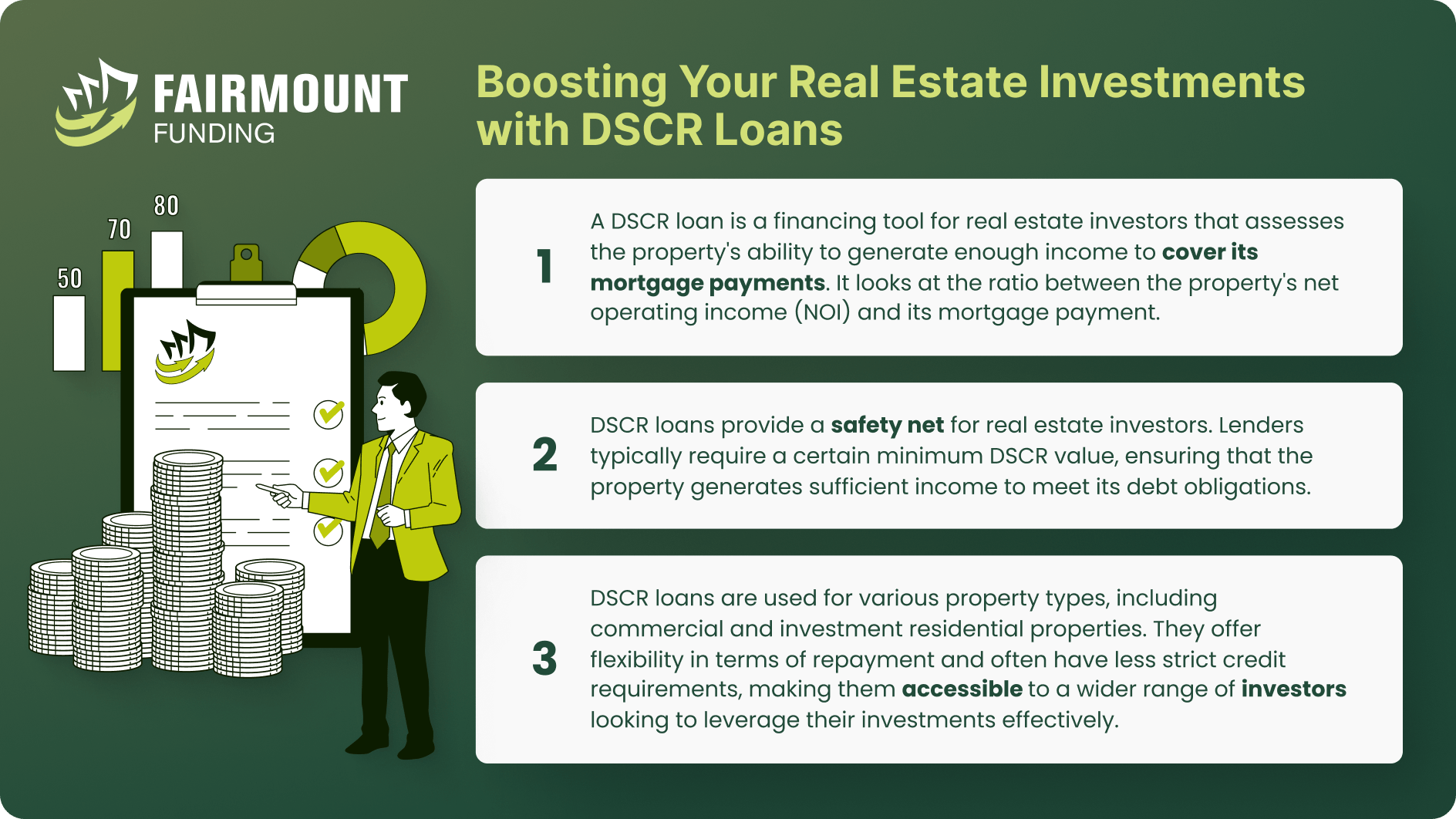
Property acquisition can be daunting for novice and seasoned real estate investors. Fortunately, a Debt Service Coverage Ratio (DSCR) loan allows investors to expand their portfolios and real estate ventures, all without necessitating proof of income or stringent qualification requirements.
At its core, a DSCR loan is designed to evaluate the income-generating capacity of a property. This distinctive feature makes DSCR loans particularly attractive to investors with less-than-stellar credit scores but own properties with strong cash flow potential. By focusing on the property’s ability to cover its debt obligations, a DSCR mortgage offers the flexibility and accessibility that traditional loans often lack.
Whether you’re venturing into real estate for the first time or seeking to diversify your existing portfolio, understanding the intricacies of DSCR loans is an important first step to harnessing their potential and making better, more informed investment decisions.
What is the debt service coverage ratio?
The debt service coverage ratio indicates whether a property has enough income to pay the mortgage. That said, DSCR measures a property investor’s capacity to cover a property’s annual debt service compared to its net operating income (NOI).
A higher NOI means more funds are available to service the debt, increasing the DSCR ratio. This can come in handy when applying for a DSCR loan. That is because it can help you determine the down payment you need and the annual debt service a DSCR lender can allow.
How to Calculate DSCR Mortgage
To calculate the DSCR, you need two key figures: the property’s net operating income and its annual debt service.
NOI represents the property’s annual income after deducting all operating expenses, and before accounting for mortgage payments. It includes rental income, property management fees, property taxes, insurance, utilities, maintenance, and other operational costs. Hence, it would be best to use this formula to determine a property’s NOI:
NOI = Gross Rental Income – Operating Expenses
On the other hand, ADS refers to the total annual cost of servicing the property’s debt. This includes the principal and interest payments on the mortgage. You can get your property’s ADS from your lender or mortgage statement.
Once you have your NOI and ADS, you can compute for DSCR using this formula:
DSCR = Net Operating Income (NOI) / Annual Debt Service (ADS)
You can use a DSCR calculator, so it will be easier to determine your real estate asset’s DSCR. Regardless, the resulting value provides insight into the property’s financial health.
A DSCR greater than 1.0 means the property’s income is enough to cover its debt obligations. Conversely, a DSCR below 1.0 suggests that the property’s income falls short of covering its debt payments, which can be a red flag for lenders and investors.
Using DSCR Loan in Property Investing
As mentioned, a DSCR can help you determine the down payment you need to make. It allows you to qualify for a DSCR loan.
In case you are wondering about the specifics of what is a DSCR loan, it is a non-qualified mortgage (non-QM) loan that provides real estate investors an alternative to secure financing. That is because investors often write off expenses on their properties, and they have no proof of income, which is a common requirement when applying for a conventional real estate loan.
On the other hand, lenders use the DSCR to determine a borrower’s capability to repay a loan without verifying income. Aside from having a DSCR that is equal to or greater than 1, DSCR loan requirements normally include:
- Credit scores of at least 620
- 20% – 25% down payment
- Property appraisal and 1007 rent schedule
Once you can qualify for a DSCR loan, you can enjoy the following benefits:
- Expedited application and approval processes. DSCR loans often feature streamlined and swift application procedures since there is no need to provide personal financial information or elaborate on employment history gaps.
- Access to funds for your property investment. That is because DSCR lenders do not look into your financial details.
- Invest in multiple properties simultaneously. While some mortgages restrict you to a single property at a time, a DSCR loan enables you to secure loans for numerous properties.
Pros and Cons of Using DSCR Loan
A DSCR loan is suitable for new and seasoned real estate investors. For newcomers to property investment, a DSCR loan can help them get the financing they need to acquire their first real estate asset. Meanwhile, seasoned investors can leverage the expedited financing process to expand their portfolio.
Nevertheless, this financial option has its drawbacks. Due to its significant down payment requirements and DSCR loan interest rates, there may be better financing solutions for some investors.
Advantages of Using DSCR Loans
- Risk Assessment: DSCR helps lenders and investors evaluate the risk associated with a property investment, ensuring the property’s income can cover its debt.
- Lender Confidence: A high DSCR indicates a lower risk for lenders, making it more likely for borrowers to secure financing.
- Investor Insights: Investors can use DSCR to assess the financial viability of an investment property, helping them make informed decisions.
- Stability: DSCRs can provide stability during market downturns, as properties with strong DSCRs are better equipped to weather economic challenges.
- Cash Flow Protection: A high DSCR provides a cushion against unforeseen expenses, protecting the property’s cash flow.
Disadvantages of Using DSCR Loans
- Complexity: Calculating DSCR requires a thorough understanding of a property’s financials, which can be complex and time-consuming.
- Variability: DSCR may fluctuate over time due to changes in rental income, expenses, or interest rates, making it less reliable for long-term planning.
- Risk of Over-Leveraging: Overreliance on high DSCR values can lead to over-leveraging, where investors take on too much debt, potentially exposing themselves to financial risk.
- Market Dependency: DSCR is influenced by market conditions, and a strong DSCR in a robust market may not necessarily hold in a downturn.
- Limited Personal Finances: DSCR loans do not consider personal finances, which could limit access to borrowers with solid financials but weaker property cash flows.
Please note that the suitability of this financing option depends on individual circumstances, property types, and investment goals. Hence, you must carefully take these factors into account before applying for a DSCR loan.
DSCR Loan FAQs
Why does DSCR matter in real estate investing?
DSCR is a key metric in real estate investing because it assesses a property’s ability to generate income and use it to cover its debt, particularly mortgage payments. It matters because it helps investors and lenders gauge the financial health and risk associated with an investment property. On the other hand, a low DSCR can signal potential financial strain and heightened risk, influencing investment decisions and financing approvals.
Is there an ideal DSCR?
An ideal DSCR varies based on the location and type of the property and market conditions. However, a DSCR above 1.0 is generally desirable.
A DSCR of 1.0 indicates that the property’s income precisely covers its debt obligations, offering no financial cushion. Many investors and lenders aim for a DSCR higher than 1.0, often between 1.2 to 1.25. This higher DSCR provides a safety margin, protecting against unexpected expenses or rental income fluctuations.
Who can take advantage of a DSCR loan?
DSCR loans are designed to be accessible to new and experienced real estate investors. New investors can benefit from DSCR loans to secure financing for their initial property investments. In contrast, seasoned investors can use them to streamline the funding and expand their property portfolios.
They are particularly advantageous for investors who may not qualify for traditional mortgages based on personal income or credit history. DSCR loans offer an alternative route to financing that relies primarily on the income-generating capacity of the investment property rather than personal financial qualifications.
Enjoy Financing Accessibility and Flexibility With a DSCR Loan
A DSCR loan is a valuable tool for property investors, regardless of their experience level. For newcomers, it opens doors to real estate investing by allowing qualification based on the property’s rental income. This financing option eliminates some of the hurdles associated with personal financial capabilities. Hence, a DSCR loan can be instrumental in getting your foot in the real estate market and building your investment portfolio.
Seasoned investors also benefit from DSCR loans as they offer a faster and more streamlined financing process. This leads to quicker expansion of property portfolios. A DSCR loan calculator can help investors make informed decisions by assessing the property’s ability to cover its debt obligations.
However, it is crucial to recognize that while DSCR loans offer accessibility and flexibility, they require higher down payment and interest rates. Therefore, all investors must conduct due diligence, utilize a DSCR calculator, and assess their investment goals and risk tolerance before leveraging this financing option.
KEY TAKEAWAYS
- The debt service coverage ratio represents the net cash flow accessible for mortgage payments.
- Both property investors and lenders use DSCR for assessing the performance of rental properties.
- Proficiency in calculating net operating income is essential in calculating a property’s DSCR..


